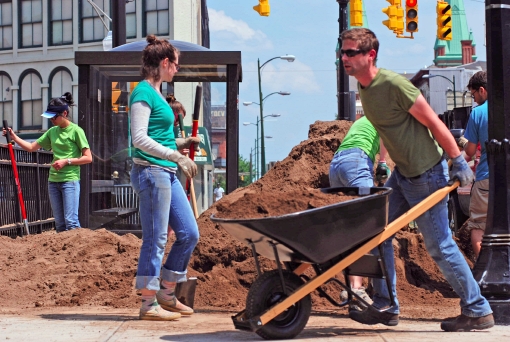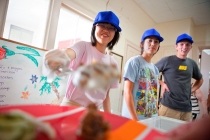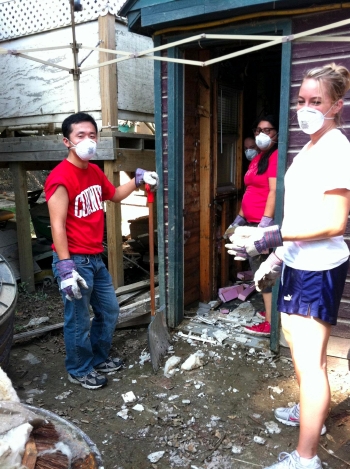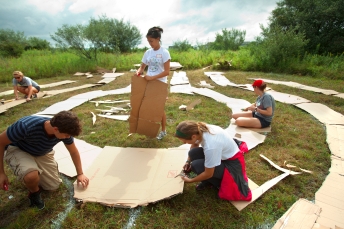ENGAGEMENT
New center will deepen public engagement, service learning, educational mission

Landscape architecture professor Paula Horrigan's Rust to Green project in Utica, N.Y., is a high-profile, ongoing service-learning course. Here, Rust to Green civic research fellows in Utica this past summer install native plantings into a newly constructed green infrastructure bioswale and a rain garden of their design adjacent to Utica City Hall.
To further foster the intertwining of educational excellence and social responsibility, Cornell has announced the new Center for Community Engaged Learning and Research. The center, which will be funded for its first three years through a gift from the Einhorn Family Charitable Trust (David Einhorn '91 and Cheryl Strauss-Einhorn '91) and with support from the Office of the Provost and the Division of Student and Academic Services, will be the core academic unit that connects public engagement to Cornell's educational mission.

Christy Pon, left, Carleen Krieb and Pat Nowak, all Class of 2014, volunteer at Ithaca's Loaves and Fishes as part of POST in 2010. See larger image
"More than at any other time in recent history, Cornell is poised to renew and expand its mission of public engagement and public service," said President David Skorton, who pointed out that Cornell's Strategic Plan includes "excellence in public engagement" as one of five objectives. "We have embraced this mandate to make community-based learning a core academic goal and a top educational priority," he added. "By establishing the new center, the Einhorns' gift will allow us not only to enhance the work we currently do but also to launch an integrated public service initiative that will place Cornell as a leader for engaged teaching, learning and scholarship."

Richard Kiely, Ph.D. '02, who had been an associate director of Cornell's Center for Teaching Excellence for the past three years, is the director of Cornell's new Center for Community Engaged Learning and Research. See larger image
Last year, the Einhorn Family Charitable Trust provided seed funding for a study to look at the broad network of experiential learning and public engagement support for Cornell students and faculty and to recommend how to create a more integrated, collaborative and networked approach to engagement on campus. The study was conducted by the Faculty Committee on Service-Learning, led by Laura Brown, vice provost for undergraduate education; Susan Murphy, vice president for student and academic services; and Ron Seeber, senior vice provost.
"We are excited to help Cornellians better engage with what they are learning in the classroom and with the world," Cheryl Einhorn said. "The outcome should be a better understanding of and empathy for society's challenges along with how we can work together to tackle them."
"This is an exciting opportunity for Cornell to be a champion for public engagement," added David Einhorn, "and we're honored to partner with the university as it aspires to produce civically engaged students of the world."
Richard Kiely, Ph.D. '02, who had been an associate director of Cornell's Center for Teaching Excellence for the past three years and has long been involved with Cornell's Public Service Center as a scholar in the field of community-engaged learning, will be the center's director.
"We have a strong tradition of engagement at Cornell," Kiely said, "and I look forward to supporting students, faculty, staff and community members in making Cornell a leader in engaged learning and research."

From left, John Rhee '12, Xochitl Cruz '12 and Ashley Maher '13 spend part of a September weekend helping residents of Owego, N.Y., clean up their homes after a devastating flood created by Tropical Storm Lee. Cornell's Public Service Center, which celebrated its 20th anniversary this year, helped coordinate volunteer efforts with Owego officials and Cornell student groups.
A tradition of experiential learning
Experiential learning – the idea that students can often learn more effectively through direct experience rather than through abstract thinking – has always been strong at Cornell, with its founding land-grant mission and history of public engagement. The role of the new center – created as a unit focused on support for the academic mission – is to foster this "scholarship of engagement" in a way that will enhance and extend the university's commitment to public engagement, Brown said.
Core to the trust's mission of helping people get along better, service learning provides students the opportunity to build positive relationships across differences; practice and better develop prosocial skills and behaviors, such as empathy, kindness, cooperation and civility; and work collectively for the common good.
There is a palpable sense of excitement among faculty members who served on the committee, Brown said, "about the opportunity to take Cornell's relationship to public engagement to another level." The university is poised to be a national leader in this area, and the time is right, she said. The center will provide an infrastructure to "produce an integrated institutional awareness" and support the efforts of existing units like the Public Service Center, which fosters community involvement and service-learning curriculum development.
Within a few months, a Provost's Fellow for Public Engagement will be named to help build an internal institutional infrastructure for public engagement.
Enhancing current efforts

New students, from left, Gina Piersanti Gioe, Chrisoula Duros, Carleen Krieb, Abigail Woughter and Alyssa Troutner work on a blooming labyrinth at Hospicare during Pre-Orientation Service Trips (POST), one of the Public Service Center's programs, in 2011. See larger image
The new center will work collaboratively, for example, with the Public Service Center to share resources, manage community partnerships and support faculty development opportunities; with the Office of Undergraduate Research to add community-based research projects into the undergraduate research experience; with the Office of International Relations/Center for International Education to coalesce university procedures and policies for students taking on community-engaged learning and research across the globe; with the Office of Academic Diversity Initiatives and the Center for Teaching Excellence to increase student and faculty involvement in service-learning courses and in course development; and with the Center for Transformative Action, New York Campus Compact and Cornell's extension system to increase the university's leadership in the growing field of higher education public engagement.
Kiely said the center's initial focus will be to promote the diversity of community-engaged learning and research at Cornell, providing professional development, funding and research opportunities. The center, he said, will give undergraduate and graduate students a guiding purpose and motivation for academic success through community-engaged learning; strengthen faculty members' involvement in the field; and oversee support for current activities and courses, the development of new courses and program and curriculum design.
For more information, visit now.cornell.edu/engaged/ or email engagedcornell@cornell.edu.